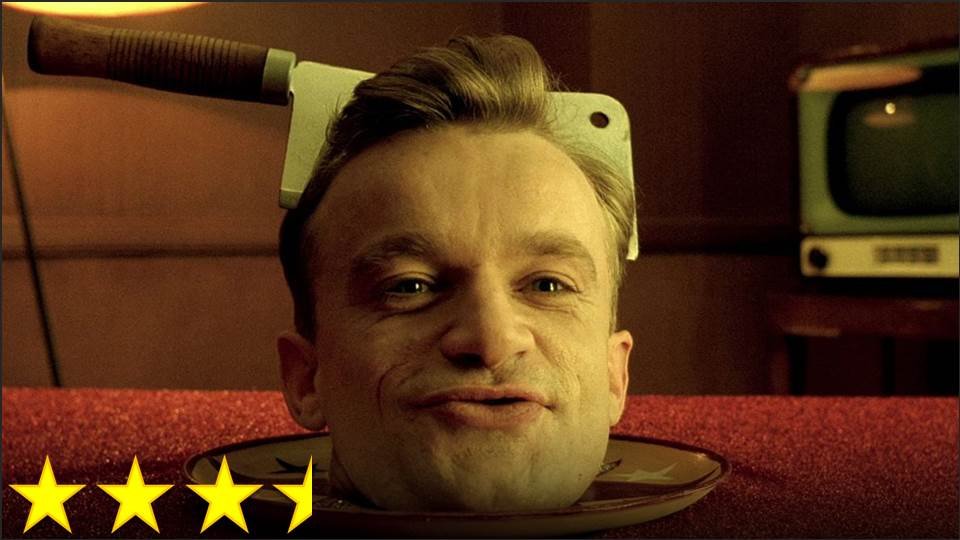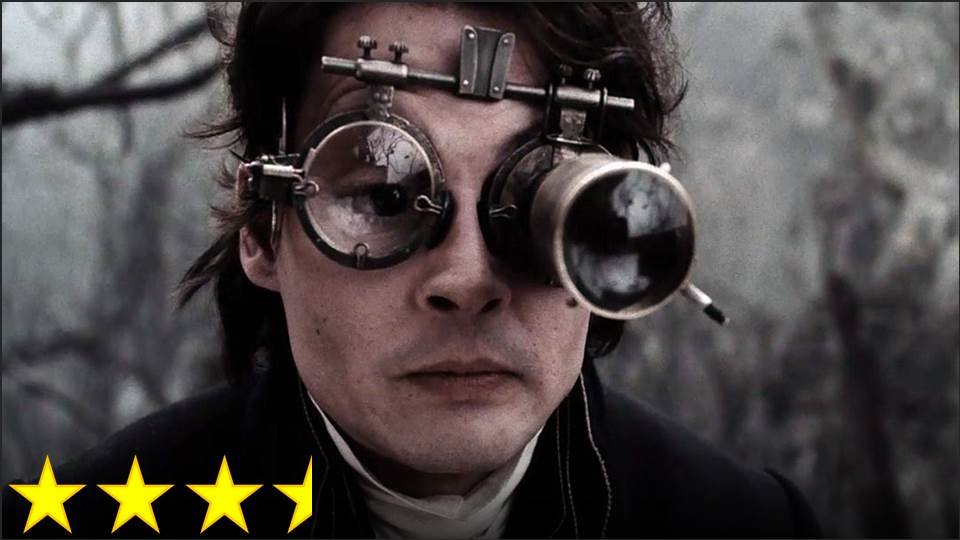It’s always difficult for me to write anything about films which have already received immense praise from countless better writers than I, so I’ll be brief: this film is practically perfect. I love it to death. One significant thing about it is that, while it is clearly a Hollywood entertainment film, it unusually has no clear place in the genre system. It’s kind of a detective drama, kind of a psychological drama/thriller, kind of a horror film, and kind of a comedy. Maybe it’s all of them, and if it is, that’s a tough balance to achieve. While this may not be my favorite Jodie Foster performance, Hopkins makes up for this in spades, and his character clearly shaped many later works of media which I love. It’s not quite in my top 20 favorite films – maybe it’s just not a very “J. D. Hansel” kind of movie – but I approve of its status as one of the best films of all time without any reservations.
1990s Movie Reviews
The Nightmare Before Christmas Review
This film has been a source of inner conflict for me for a long time. I saw most of it years ago, but I couldn’t finish it. I found it too boring, even though I recognized its creativity. I thought that I could overcome this dilemma by coming back to it a few years later, but sadly, I’m still caught in the same spot.
This film is brilliant. Its visuals are absolutely stunning, and the attention to detail is so praiseworthy that one would have to bow down to Henry Selick in order to overstate how great the detail is. Even the very idea of the film, with all of its characters and little gags, is pure genius. In a way, I love this film. The problem is that it gets very dull very fast.
The reason for this is that the film only has one note – or at least it holds the same note too long. There are a few moments that stand out in the film as contributing something different to the film from its usual aesthetic: the scene in Christmas Town, the scene in which the toys attack the children on Christmas, and the scenes in which Santa is in the clutches of the Boogie Man. All of these scenes are strong, and I like them a lot – the first is charming, the second is very Gremlins, and the third is very Tim Burton. Apart from these, however, most of the film is just the same few feelings and motifs on repeat.
Some of this is due to the writing, and the actors might be partly to blame also, but this one mostly falls on Elfman. “This Is Halloween” is a good, catchy song, but almost all the other songs run together and are nearly impossible to tell apart. They all use the same few chords and are very limited in the emotions they express. Consequently, the film feels like a broken record. So I don’t think I could stand to watch this film every year, but since there’s clearly a lot to love hear, I’ll try to squeeze it in a couple times a decade.
Delicatessen Review
I think the first time I ever saw a scene from a French film was in one of my classes at Harford Community College. The professor showed a brief clip in which residents of an apartment were all moving in unison to the rhythm of a couple having sex on a bed. I never knew where it came from, but I would have liked to see the whole film since this scene struck me as both humorous very artistic.
I think the first time I ever saw a French film all the way through was when I watched Amélie. Consequently, the stylistic choices of Jean-Pierre Jeunet formed my entire schema of what a French film was for a very long time – I think I assumed that his style was normal for French cinema because I didn’t realize the scene I had seen from Delicatessen was by the same director. Now that I’ve seen many more French films, I can clearly see how Amélie and Delicatessen clearly belong in their own little corner doing their own little thing.
After a bit more consideration, however, what’s struck me is just how different the two films are. Amélie, while it engages with the dark and gloomy, is extremely romantic, and Delicatessen, while it engages with romance, is extremely dark and gloomy. Delicatessen takes pride in its repulsiveness, and for some strange reason, I appreciate that. It’s a very icky movie, and I think it may have started a lot of bad trends in the filmmaking styles of the 1990s (bland color schemes, excessive fish-eye lenses, etc.), but it’s still clever, slick, and a well of creative inspiration. Don’t make the same mistake I did – now that you know about it, see it sooner rather than later.
The Visitors Review
Alternative Title: Les Visiteurs
My uncle never liked Monty Python was he was younger – he just found it too stupid to be enjoyable. Eventually, as he got older, he kind of came around, but he attributes it to getting old and losing a few brain cells. I have a hard time understanding that because I love Holy Grail and Life of Brian, but I found myself experiencing a similar disdain for immense stupidity while watching this film.
Les Visiteurs is a French comedy about a knight and his servant in the year 1123 who accidentally travel to France in 1992 and have to get back. It’s a very stupid, stupid comedy, but the French people, weirdly enough, love it. It was #1 at the French box office in its day, and it is the fifth-highest-grossing film in the country today, so the professor of my French Film and Culture class had to show it.
The professor noted that the film has some resemblance to Monty Python, but, while I can see that, I think it’s too focused on making gross, obvious, and in-your-face jokes, without the more cerebral critique of humanity’s pathetically mechanical nature that Python does so well. The film also has many bothersome scenes showing grotesque transformations of faces, which remind me of some of the films based on the works of Roald Dahl in that the imagery is more unsettling and uncanny than entertaining. I don’t hate the film – some parts are funny – but maybe I’ll appreciate it more if I lose a few brain cells.
Sleepy Hollow Review
It’s always a pleasure to see a spooky movie that doesn’t rely too much on jump scares, instead reveling in a charmingly eerie aesthetic with creepy visuals. In fact, it’s even a pleasure to find a film that’s not just trying to be a horror movie, but is specifically trying to be a Halloween movie. It’s a special pleasure to watch a Halloween movie that’s not just throwing clownish, irritating exaggerations of Halloween character types at me the whole time. This is the kind of pleasure I have come to expect from few directors but Tim Burton, who brings his knack for nightmarish aesthetics to the Washington Irving tale “The Legend of Sleepy Hollow.”
Now, to be clear, this is not Burton at his best – by this point in his career we’ve already entered the phase in which he’s making everything bland and gray – but it’s still a fun watch. Johnny Depp is as over-the-top as one would hope, without being annoying, and the rest of the cast is largely comprised of some of my favorite British actors. The only problem here is that this great cast is working on great sets with a great director to bring to life a not-so-great screenplay. It’s a predictable story with the usual bashing of “men of reason” for having too much certainty. Yes, that’s right – the people who believe 100% in a headless horseman of all things accuse the sensible detective of having too much faith, all because he’s pretty sure he ought to be looking for a real, living murderer rather than an undead legend. Now, I’ve seen this foolishness in enough Hollywood films that, for a silly fantasy story, I can almost let it go, so I can still mostly enjoy the movie. The story may be weak and a little slow, but it’s still something I can see myself putting on the big TV every few Octobers.
The Matrix Review
I was brought here by The Question. It’s the question that’s been playing in my head on a loop ever since I first started studying film. It’s the question I, as a movie buff, have been asked more than any other: “What do you think of The Matrix?”.
Really. This actually happens.
Whenever someone hears that I’m a film major, they’ll ask me about my favorite film or director, what kind of movies I’d like to make, and what I think of The Matrix. Sometimes they’ll ask about Christopher Nolan movies, of which I have seen very few, but usually it’s The Matrix. But do you know what the answer to The Question is?
It’s fine.
It’s a perfectly fine movie. It’s creative, visually impressive, and kinda fun. So why does everyone care so much what the movie buffs think of it?
I can only assume it’s because the average moviegoers think there’s much more to this film than they can grasp in one viewing. They see a certain depth to it – an intellectual, philosophical quality – and they think that we film students hold the key to seeing just how brilliant it is. Once the average viewer realizes that Neo’s life parallels that of Jesus Christ, he/she can’t help but wonder what other messages and analogies the movie contains that are only visible to those in the know.
Well, I have good news: I do know the key to understanding everything that this film is about … but, believe it or not, I didn’t learn this from studying film. I learned it because I study philosophy. Every philosophy student should know where I’m going with this.
Do you want to know what this movie is really about? Do you want me to spoil it for you? If not, you can just click the ‘X’ for this tab and go back to browsing the rest of the web, and you’ll continue to see The Matrix as the same work of genius you’ve always thought it was. But, if you want to know the truth, click the line below. A warning: once you know the truth, there’s no going back.




